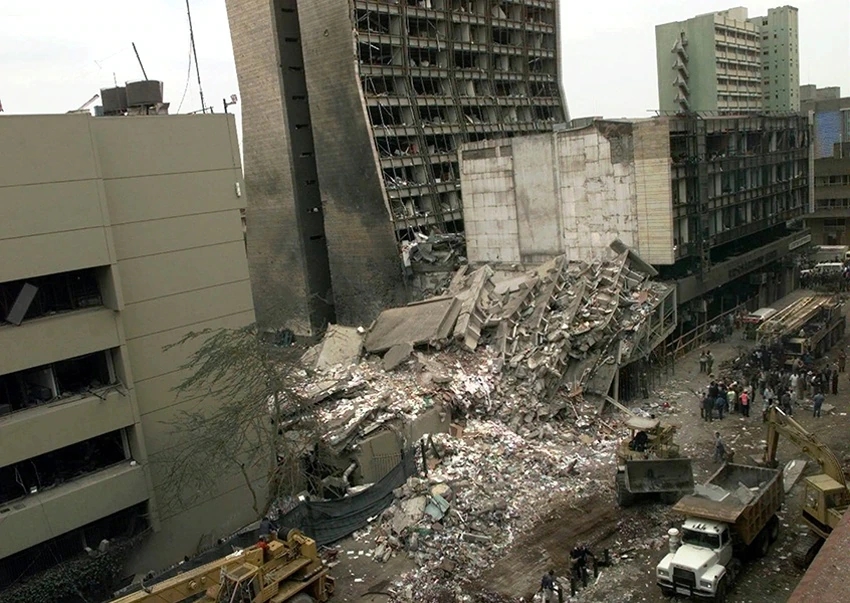- Background
- Basic Texts
- Additional Resources
- ICJ Advisory Case – The Wall (Security Barrier in Judea and Samaria)
- ICJ Advisory Case – Legal Consequences Arising from Israel’s Policies and Practices
- ICJ Advisory Case on Israel’s Obligations to the UN and Other Organizations
- ICJ Case – South Africa v. Israel: Genocide Accusation
- ICJ Case – Nicaragua v. Germany: Genocide Accusation
- ICJ Case – Relocation of the U.S. Embassy to Jerusalem
- The ICJ and the Genocide Convention
“The International Court of Justice (ICJ) is the principal judicial organ of the United Nations. It was established by the United Nations Charter in June 1945 and began its activities in
April 1946. The seat of the Court is at the Peace Palace in The Hague (Netherlands). Of the six principal organs of the United Nations, it is the only one not located in New York. The Court has a twofold role: first, to settle, in accordance with international law, legal disputes submitted to it by States (its judgments have binding force and are without appeal for the parties concerned); and, second, to give advisory opinions on legal questions referred to it by duly authorized United Nations organs and agencies of the system. The Court is composed of 15 judges elected for a nine-year term by the General Assembly and the Security Council of the United Nations. Independent of the United Nations Secretariat, it is assisted by a Registry, its own international secretariat, whose activities are both judicial and diplomatic, as well as administrative. The official languages of the Court are French and English. Also known as the “World Court”, it is the only court of a universal character with general jurisdiction.
The ICJ, a court open only to States for contentious proceedings, and to certain organs and institutions of the United Nations system for advisory proceedings, should not be confused with the other — mostly criminal — judicial institutions based in The Hague and adjacent areas, such as the International Criminal Court (ICC, the only permanent international criminal court, which was established by treaty and does not belong to the United Nations system).” [From ICJ Press Release No. 2018/57]
More extensive background and history is on the ICJ website.
Basic Texts (The following are also available on the ICJ website)
United Nations Charter (Articles 92-96)
Article 92
The International Court of Justice shall be the principal judicial organ of the United Nations. It shall function in accordance with the annexed Statute, which is based upon the Statute of the Permanent Court of International Justice and forms an integral part of the present Charter.
Article 93
1. All Members of the United Nations are ipso facto parties to the Statute of the International Court of Justice.
2. A state which is not a Member of the United Nations may become a party to the Statute of the International Court of Justice on conditions to be determined in each case by the General Assembly upon the recommendation of the Security Council.
Article 94
1. Each Member of the United Nations undertakes to comply with the decision of the International Court of Justice in any case to which it is a party.
2. If any party to a case fails to perform the obligations incumbent upon it under a judgment rendered by the Court, the other party may have recourse to the Security Council, which may, if it deems necessary, make recommendations or decide upon measures to be taken to give effect to the judgment.
Article 95
Nothing in the present Charter shall prevent Members of the United Nations from entrusting the solution of their differences to other tribunals by virtue of agreements already in existence or which may be concluded in the future.
Article 96
1. The General Assembly or the Security Council may request the International Court of Justice to give an advisory opinion on any legal question.
2. Other organs of the United Nations and specialized agencies, which may at any time be so authorized by the General Assembly, may also request advisory opinions of the Court on legal questions arising within the scope of their activities.
- Statute of the International Court of Justice pdf html ICJ website
- Rules of the Court
- Handbook of the Court
- UN Security Council Resolution 9, 15 Oct 1946 (Admission of States Not Parties to the ICJ Statute)
- Shabtai Rosenne, The World Court: What It Is and How It Works, 5th ed. (1995); 6th ed. (2003)
- Malcolm Shaw, International Law, 8th ed., Chap. 18: The International Court of Justice (2017)
- Hugh Thirlway, The Law and Procedure of the International Court of Justice: Fifty Years of Jurisprudence (2013)
- Hugh Thirlway, The International Court of Justice (2016)
- A. Mark Weisburd, Failings of the International Court of Justice (2016)
- A. Mark Weisburd, The International Court of Justice and the Concept of State Practice, 31 U. Pa. J. Int’l L. 295 (2009)
- Andreas Zimmermann, Christian J. Tams, Karin Oellers-Frahm, Christian Tomuschat , The Statute of the International Court of Justice, A Commentary, 3rd ed. (2019)












